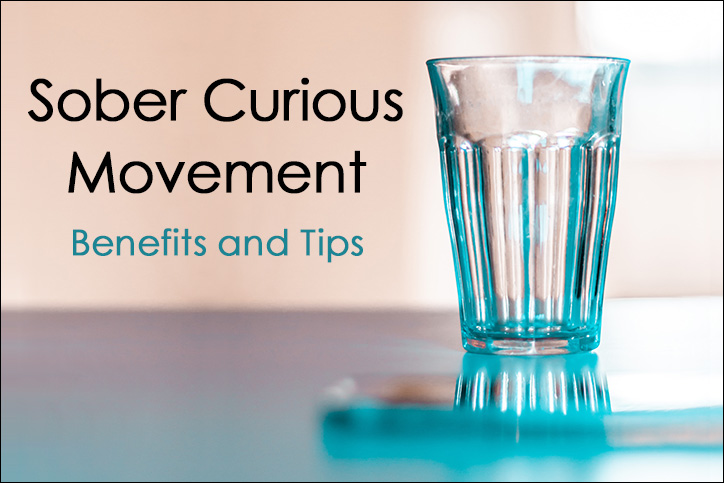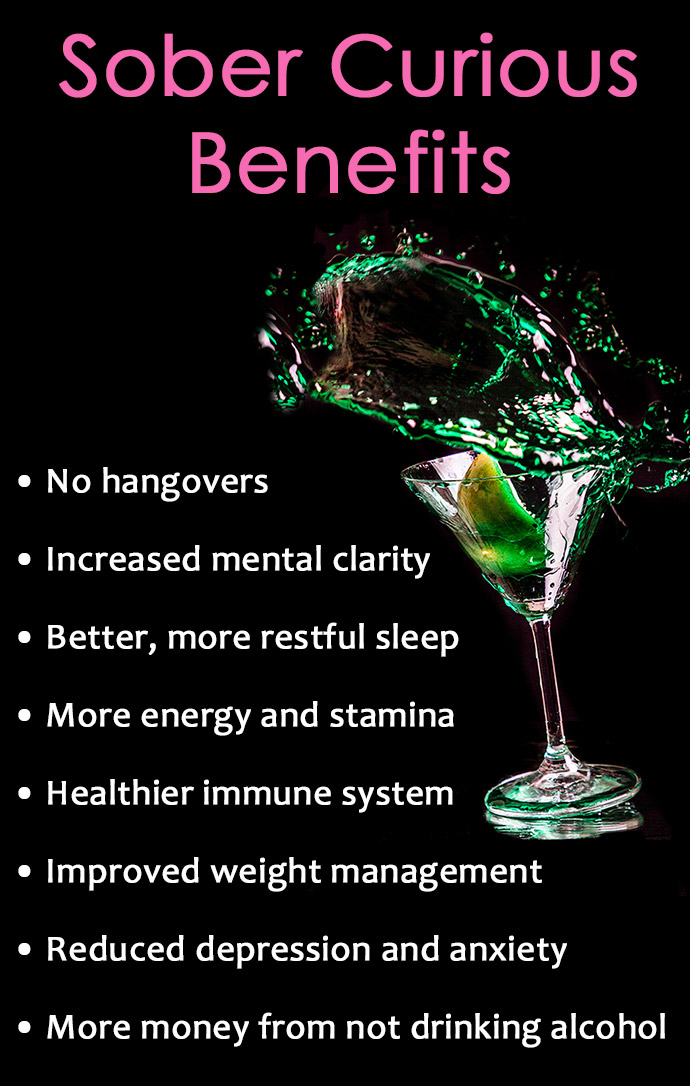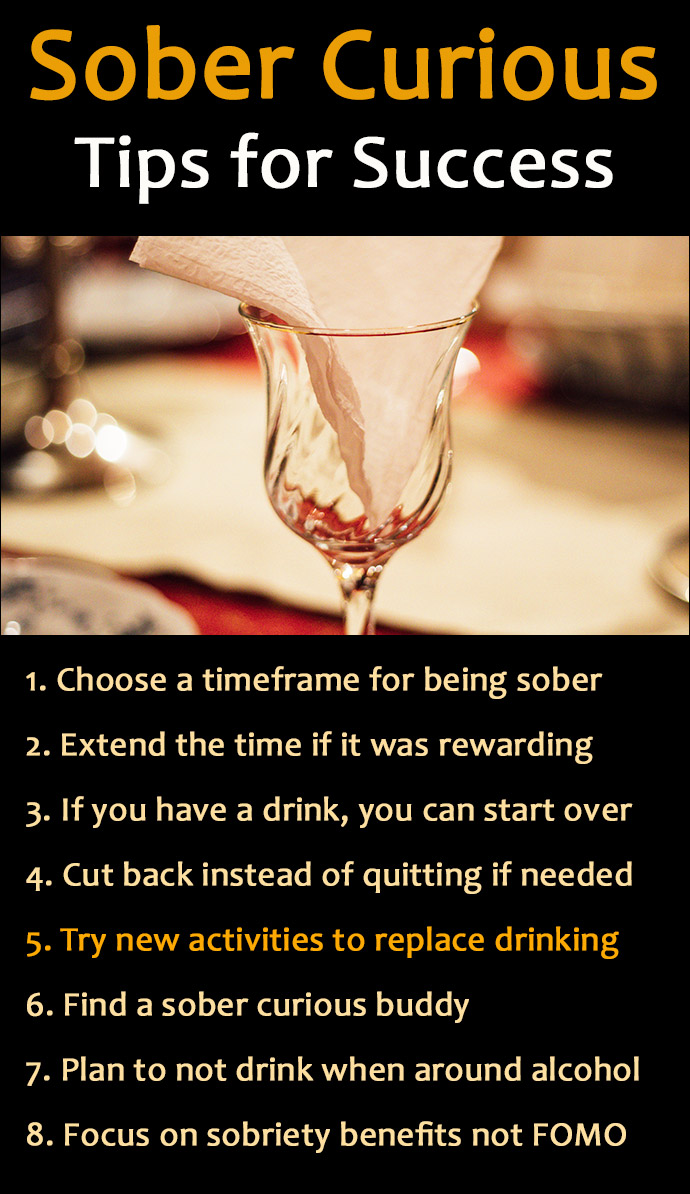Table of Contents
In recent years, a large number of people have become sober curious about cutting back on drinking alcohol, or maybe even quitting for monthly stretches at a time.
For some people, it’s a general concern about alcohol’s effects on overall health and well-being.
For others, it might be some regret about the choices they make while drinking.
Whatever the case may be, many people have joined the sober curious movement as a way to look at the impact that alcohol has on their life.
If this sounds familiar, it’s important to understand that taking even a temporary break from drinking alcohol not only benefits physical and mental health, but it can also provide a new perspective about how we interact with alcohol.
Opting for a period of sobriety does not necessarily mean a person has a drinking problem or addiction to alcohol. It’s really more about discovering lifestyle changes and trying something that may be beneficial.
What is the Sober Curious Movement?
The Sober Curious Movement has worked its way into popular culture in recent years as a way of taking a break from drinking alcohol for some designated period of time.
A lot of people have jumped on the Dry January and Sober October bandwagons as a way to improve their health, maybe lose a few pounds before or after the holidays, and to feel the positive effects of better sleep and increased energy.
The sober curious movement goes one step further than just mere abstinence.
Whether for a week, a month or a year, people often use the time away from alcohol to examine their relationship to drinking regularly.
Those curious about their alcohol use might not feel dependent to booze or experience any negative impacts from drinking. But they may realize they are only imbibing because it is expected of them rather than something they want to be doing.
Sober curiosity is also an excellent way to create new habits, experience activities without the influence of alcohol, and explore alternatives to a new way of living.
The term “sober curious” was coined by Ruby Warrington, and it spawned the movement that began with her original book, “Sober Curious: The Blissful Sleep, Greater Focus, Limitless Presence, and Deep Connection Awaiting Us All on the Other Side of Alcohol,” as well as her podcast and follow-up book.
Sober Curious Lifestyle Benefits
While not necessarily a permanent change or even a strict no drinking policy, there are several benefits to engaging with the sober curious movement.
Because drinking is so embedded in our culture, it’s easy to forget that alcohol is a powerful depressant. Especially if used in excess, it can have a number of negative effects on both our mental and physical health.
Typical Benefits can include:
- Greater mental clarity and focus
- Better and more restful sleep
- Increased energy and stamina
- Stronger and healthier immune system
- Improved ability to manage weight loss
- Fewer mood shifts associated with depression or hangxiety
- No hangovers
- More money from not drinking alcohol
How to Make the Most of Being Sober Curious
If the benefits of being sober curious sound enticing, the next step is learning how to create a plan for not drinking that will provide the best opportunity for success.
The first thing to remember is not to bite off more than you can chew. Picking a reasonable amount of time (a week, two weeks, or a month) is easier than deciding to go for an entire year, at least in the beginning.
At the end of the first stretch of sobriety, if it makes sense to increase the amount of time, then can go into another reasonable extension with even greater confidence.
Another key thing to remember is that just because you may have a drink before the end of the sobriety period, it doesn’t necessarily mean that the experience has been a failure.
Simply recommit to getting to the end of the sobriety period yet again.
If completely cutting out alcohol feels overwhelming, start by moderating the amount you drink and work up to avoiding alcohol for longer periods.
Sober Tips for Success
One of the primary challenges of being sober curious is figuring out how you will spend your time.
For some people, it may be easy to go out with friends like normal and just not drink. The temptation to drink though, might be too stressful for others.
For these people, a solution can be to invite friends you may normally drink with to join you for walks, hikes, an afternoon event, or any number of other activities that don’t include alcohol.
Other options include having a sober curious buddy to go out with and remain alcohol free, or to participate in activities that don’t involve drinking. Establishing sober curious meet-ups is also a great way to find new, like-minded people.
Self-care strategies for being sober curious do require some planning.
For instance, if you do plan on going to a place where there is going to be alcohol, have a plan in place for simply saying, “No, thank you,” when offered a drink.
Yet another excellent goal is to focus on all the benefits of staying sober for a certain period of time instead of giving in to the fear of missing out (FOMO). By concentrating on the things we gain, it lessens the feeling that we’re missing out on fun.
Does the Sober Curious Movement Work for Everyone?
For people who are causal drinkers or don’t have a serious drinking problem, taking a break from alcohol can be a healthy and rewarding experience.
Those who get the most from being sober curious are often young adults that want to live a healthier lifestyle, or older adults who come to terms with the negative impact alcohol has on their life.
On the other hand, people recovering from an alcohol dependency or addiction do not generally have the ability to stop drinking for a short period of time and safely pick it back up later.
In fact, some people who are sober curious might realize that their relationship to alcohol is much more complicated than they anticipated.
Individuals with an alcohol addiction who are heavy or prolonged drinkers might want to consider outpatient or inpatient alcohol treatment before quitting cold turkey.
Making the decision to quit drinking if it’s a real problem can be a wise choice, but is often difficult to do alone without professional help.
A serious addiction often requires beginning with an alcohol detox program that will safely manage withdrawal symptoms before continuing with treatment therapies to avoid relapse.
The good news is the sober curious movement has been growing steadily in the past few years and more people are now considering cutting back on alcohol use or even stopping completely.
With more people being sober, it makes it easier for those who want to join in the movement.





